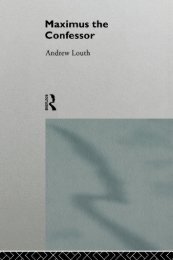Gospels of Thomas and Philip and Truth - Syriac Christian Church
Gospels of Thomas and Philip and Truth - Syriac Christian Church
Gospels of Thomas and Philip and Truth - Syriac Christian Church
You also want an ePaper? Increase the reach of your titles
YUMPU automatically turns print PDFs into web optimized ePapers that Google loves.
abrogation; compare e.g. Ezek 18 with Mt 6:14-15.)<br />
• 32. Gen 49, Jud 2:16 ff., Mt 19:28, Ac 1:13-26, Rev/Ap 2:2!!, 21:14 || I-Cor 9:1-2,<br />
II-Cor 11:5-13<br />
Finally, we must observe the fact that the permanent tally <strong>of</strong> the Apostles was<br />
established by the Savior at exactly twelve (for obvious reasons <strong>of</strong> historical<br />
symbolism— note the symmetry at Rev/Ap 21:12-14), <strong>and</strong> moreover that Paul was<br />
never numbered in that circle; not even Barnabas in his Epistle recognizes Paul’s<br />
Apostleship!: ‘[Those] to whom he gave the power <strong>of</strong> the Gospel to preach, <strong>and</strong><br />
there are twelve as a testimony to the tribes, because there are twelve tribes <strong>of</strong><br />
Israel’ (8:3).<br />
III<br />
Paul <strong>of</strong> Tarsus is an engimatic <strong>and</strong> paradoxical figure. Caught in the ethical<br />
dilemma <strong>of</strong> calling all men transgresors by the Torah, only to reject the Torah<br />
precisely for thus condemning them (Gal 3:10!), he was unacquainted with Christ's<br />
historical teachings <strong>and</strong> practice; nor was he willing to learn <strong>of</strong> them from the original<br />
Apostles (Gal 2:6). Thus his soteriology focused entirely on the Passion, <strong>of</strong> which he<br />
was aware, interpreting Christ's mission as exclusively an OT Sacrifice. Whereas the<br />
innovating Messianic message— Christ's teachings as incarnate in his lifestyle,<br />
elaborated thruout the canonical <strong>Gospels</strong> prior to the Passion narratives— was<br />
entirely unknown to Paul. (On the 3-valued logic <strong>of</strong> Biblical morality, See Perfect in<br />
Ph Notes)<br />
This is not to deny that he composed some eloquently poetic passages (such as<br />
Col 1:15-20); but these must, in light <strong>of</strong> the aforelisted doctrinal conflicts, be<br />
considered no more than ornamentation in Paul's writings. Those documents, in their<br />
entirety, proclaim a discipleship which is fundamentally incompatible with the<br />
message <strong>of</strong> Christ himself as recorded in the historical <strong>Gospels</strong>.<br />
Remarkably enough, prior to Clement <strong>of</strong> Alex<strong>and</strong>ria <strong>and</strong> Irenaeus <strong>of</strong> Lyon at the<br />
close <strong>of</strong> the second century, there is no single author who quotes from both the<br />
<strong>Gospels</strong> <strong>and</strong> Paul's Epistles. There was thus an exceedingly long period <strong>of</strong> schism<br />
between the traditions <strong>of</strong> the Twelve <strong>and</strong> <strong>of</strong> Paul, prior to the earliest attempts at<br />
integration.<br />
And yet the irony, <strong>of</strong> course, is that the canonical <strong>Gospels</strong> themselves, <strong>of</strong> which<br />
tradition Paul was so manifestly ignorant, were ultimately only preserved by the<br />
133




